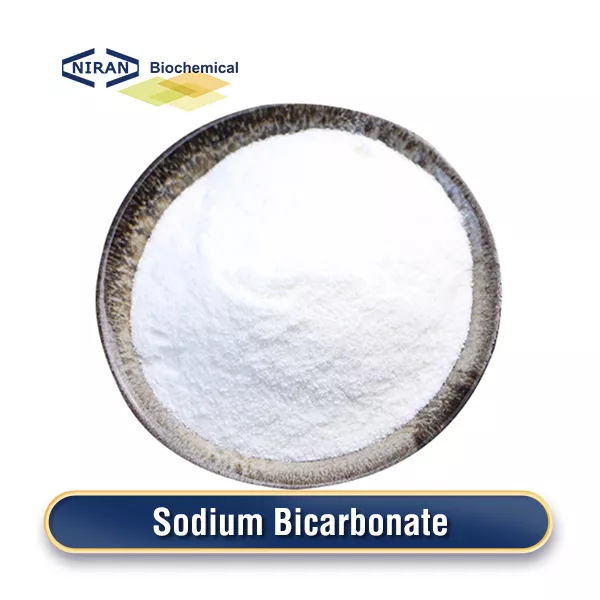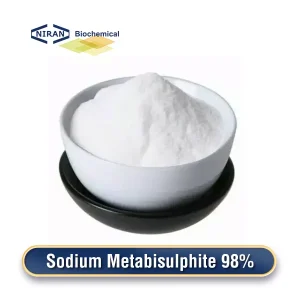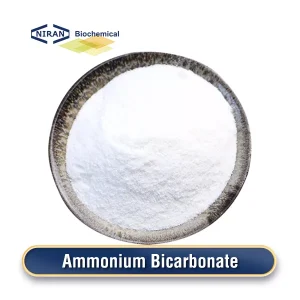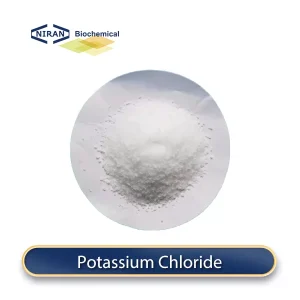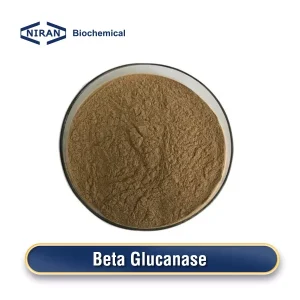Niran Biochemical
YOUR RELIABLE FOOD INGREDIENTS
Send Inquiry
Home » Products » Other Food Ingredients » Sodium Bicarbonate
Sodium Bicarbonate
- CAS: 144-55-8
- Chemical Formula: NaHCO3
- Certification: KOSHER, ISO, HALAL, FSSC22000, BRC, etc.
- MOQ: 1000KG
- Shelf Life: 2 Years
Inquire Product
Product Description
What is Sodium Bicarbonate?
Sodium bicarbonate is an inorganic substance that can take the form of tiny crystals or white powder. It has no smell, is salty, soluble in water, breaks down quickly in the presence of heat, and releases carbon dioxide gradually as it breaks down in humid air. It is extensively utilized in many industrial domains, including the food, pharmaceutical, chemical, textile, and light industries, as well as in everyday life.
There are mainly the following processes for the production of sodium bicarbonate in China:
- Extracted from natural pure soda ore (pure natural refractory earth stone, composed of sodium bicarbonate and sodium carbonate). These ores are generally rich in sodium bicarbonate. After mining, crushing, leaching, crystallization and drying, baking soda is finally obtained.
- Sodium carbonate reacts with ammonia to obtain sodium bicarbonate, which is then heated and decomposed to produce baking soda. Large-scale production can be accomplished with this technique, which is more prevalent in industrial production.
- Sodium carbonate is dissolved in water, and then carbon dioxide gas is introduced to generate sodium bicarbonate, which is then heated and decomposed to obtain baking soda.
- Sodium carbonate reacts with oxygen in the air to generate sodium bicarbonate, which is then heated and decomposed to produce baking soda.
Related parameters:
| ITEMS | Specifications |
| Appearance | White crystalline powder |
| Assay (dry Basis, %) | 99.0-100.5 |
| pH (1% Solution) | ≤ 8.6 |
| Loss on Drying (%) | ≤0.20 |
| Chlorides (Cl, %) | ≤0.50 |
| Ammonia | Pass test |
| Insoluble substances | Pass test |
| Whiteness (%) | ≥85 |
| Lead (Pb) | ≤ 2 mg/kg |
| Arsenic (As) | ≤ 1 mg/kg |
| Heavy Metal (as Pb) | ≤ 5 mg/kg |
Recommended dosage:
| Food name | Maximum usage(g/kg) |
| Bread and rusks | 1-5 g/kg |
| Biscuits | 1-5 g/kg |
| Candy and chocolate | 1-5 g/kg |
| Beverages (such as soda) | 0.1-0.5 g/kg |
| Dairy products | 0.1-1 g/kg |
| Condiments and sauces | 0.5-5 g/kg |
| Yeast products (such as fermented dough) | 1-5 g/kg |
| Ham and meat products | 0.1-1 g/kg |
| Preserved foods | 0.5-5 g/kg |
| Seasoning powders | 1-5 g/kg |
| Alcoholic beverages (such as fermented wine) | 0.1-0.5 g/kg |
| Coffee and tea beverages | 0.1-0.5 g/kg |
Sodium Bicarbonate has a wide range of uses
- Baking soda reacts with acidic ingredients (such as yeast, lemon juice, etc.) to produce carbon dioxide gas, which promotes dough expansion and food fermentation, and is used in baked foods such as bread and cakes.
- When heated, baking soda decomposes and releases carbon dioxide gas, which increases the volume of food and improves the taste and texture, such as in biscuits, pancakes and other foods.
- Baking soda can neutralize the sour taste in food, improve the taste of food and balance the flavor, especially in foods such as jams and jellies.
- By adjusting the pH of food, baking soda can enhance the stability of food and extend the shelf life of products, such as in sauces, salad dressings, etc.
- Baking soda can be used as an antioxidant in some specific cases to help maintain the freshness and color of food, especially in some processed fruit and vegetable products.
- In some cases, baking soda can be used as an emulsifier to help prepare and stabilize oil-water mixtures in food, such as in frozen desserts and dairy products.
User asked question:
Q: Can sodium hydroxide be used directly as a substitute for sodium bicarbonate in food?
A: The function of sodium bicarbonate in food preparation cannot be easily replaced by sodium hydroxide. Sodium bicarbonate is often used as a leavening agent, neutralizer and expander to improve food properties by releasing carbon dioxide gas or adjusting pH.
Sodium hydroxide is a strong base and requires extreme caution when used. It is usually used in industry and cleaning agents. Its application is not suitable for food manufacturing due to its potential harm to food quality and human health.
Q: As one of the largest producers of sodium bicarbonate, what are the advantages of China?
A: China is one of the world’s major producers of food-grade sodium bicarbonate, with its advantages in abundant alkali mineral resources, mature production technology and low-cost production capacity.
China’s chemical companies are able to efficiently produce baking soda that meets global food safety standards and meet the global market demand for this product through strong export capabilities.

